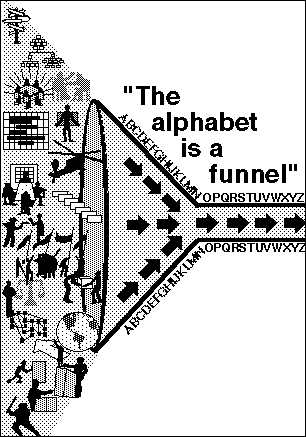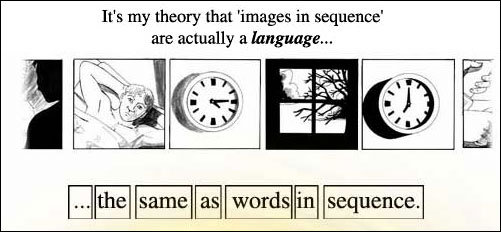September 28, 2003
Reading PIctures
So, in preparing for my keynote on modelling human behavior observed in research, I've taken a detour into the world of Visual Languages.
It began by looking up Tufte's Visual Explanations, and then trying to find texts related to it. Click through books under the subject "visual communication," I came across Visual Language, a book by Robert E. Horn. I've come across his stuff before, but never pursued it deeply. Now seemed the time.

The book is intriguing. Robert essentially lays out a deconstruction of visual language, beginning with the elements "words," "shapes", and "images," and then showing the various way these things can be cobbled together to communicate in a fashion richer than afforded with just one of the elements. The book is valuable for its breadth and depth alone -- a veritable catalog of ways that people have used visual language to communicate over the years. The book's single greatest disappointment is its ugliness -- the imagery too stark, the typography clumsy, the point often lost in hard-to-read graphics. This speaks to the fact that Horn seems to be most focused on a business audience -- the land of PowerPoint -- and so not as concerned with subtlety.
This business focus was disappointing... My cursory research leads me to suspect that the social sciences and humanities are *terrible* when it comes to utilizing visual language (with the occasional exception of statistics representations). I hope Horn's message is breaking beyond middle management and helping convince academia that the primacy of The Word above all else is shortsighted and foolish.
So today I've been wandering the Web, looking for more. I haven't found anything useful to my talk, but I've uncovered some keen items.

Emaki Productions is the web home of Neil Cohn, a decidedly precocious pup (he seems to have gotten his undergrad degree in 2002), who has written a fair amount about communicating visually. He seems to favor narrative and comics... Reading his site immedately calls Understanding Comics to mind.
![]()
The Visual Language Collection offers facet freaks a change to see an clever interface to a faceted classification collection. Unfortunately, the site isn't yet live.
Oh, and of course, there's Tufte's site. I don't need to mention that, do I?
And, um, that's it. I had trouble finding good stuff. Maybe you've got some pointers? It's interesting how poorly represented this field of visual language is, considering its prevalence and increasing importance. But I guess it's not "owned" by any one discipline, it's utilized across disciplines, and so there's no focused need for research and analysis.
